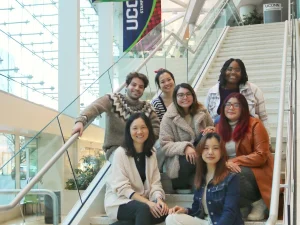
Torri Ann is a research scientist in the HELLO (Hearing Experience Language Learning Outcomes) Lab. The biggest project in the lab is our Parent Infant Eye-tracking (PIE; Protocol #H23-0448). In this study, they have parents of children who are D/deaf or hard of hearing complete a videotaped 10-minute play session. The parents wear eye-tracking units (like glasses), and the lab assesses how the eye gaze of parents and children relates to spoken word learning! Torri Ann also has other studies that are a continuation of her dissertation looking at parent education around early intervention.
Being a Connecticut native, Torri Ann started her educational journey at UConn, earning a BA in Psychology and Speech, Language, and Hearing Science with minors in Cognitive Science and Neuroscience. For her Master’s, Torri Ann moved to DC and attended Gallaudet University, the only University in the world that runs in American Sign Language. Once back from DC, she earned her PhD in Speech, Language, and Hearing Sciences at UConn. Her interest in research comes from wanting to be the best support possible for families and children who are D/deaf and hard of hearing.
Torri Ann loves to spend her time with her dog, Marah Jade (a deaf retired service dog), family, and baby daughter. They love to go hiking, watch Bluey, and visit Old Sturbridge Village!
Torri Ann hopes to see you in her Lab!












